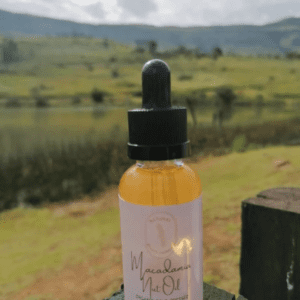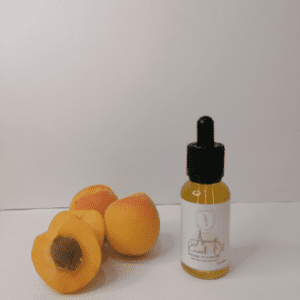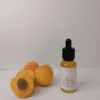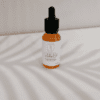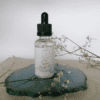Contents:
Choose from a 30ml or 5ml rosehip oil in glass bottle with dropper bottle, packaged in cardboard shipper box.
What is rosehip oil?
Rosehip oil is also known as rosehip seed oil.
rosehip oil is pressed from the fruit and seeds of the rose plant.
Prized since ancient times for its valuable healing benefits, rosehip oil is loaded with skin-nourishing vitamins and essential fatty acids. It also contains phenols that have been shown to have antiviral, antibacterial, and antifungal properties
WHAT CAN ROSEHIP OIL BE USED FOR?
Rosehip Oil is a plant derived natural product that offers proven benefits to your skin. Here are some of the benefits and uses of Rosehip Oil:
Fights premature ageing and fine lines – start adding Rosehip Oil to your daily skincare routine and watch the difference as your skin becomes firmer, softer and more youthful.
Face moisturiser – Rosehip Oil has high levels of essential fatty acids and can be used instead of a moisturiser. It has several anti-ageing benefits.
Skin blemishes and scars – Use Rosehip Oil on stretch marks, age spots, acne, hyper-pigmentation, burns and scars to help diminish their appearance.
Dry skin – Apply Rosehip Oil to dry and cracked skin to nourish and rehydrate it. It’s especially effective on hands, elbows, knees and heels.
Dry cuticles and brittle nails – Massage Rosehip Oil into your hands, cuticles and fingernails daily to help restore youthful skin, prevent cracked cuticles and nourish brittle nails.
Lifeless hair – Warm up a little Rosehip Oil and gently massage into your hair and scalp to help repair dull and lifeless hair.
CAN ROSEHIP OIL BE USED ON SENSITIVE SKIN?
Yes, Rosehip Oil can be safely used on all skin types, including sensitive skin. Used regularly, it will help to bring a beautiful, natural glow to your face and leave it feeling soft and hydrated. If you have extremely sensitive skin or are prone to allergies, test the Rosehip Oil by dabbing a little on your inner forearm or under your jawline, and wait for 24hrs before applying it to large areas.
Patch testing can be done on the inner forearm or inner thigh area. Rosehip Oil is an excellent remedy for scarring caused by bruising, acne, sun damage or chicken pox. Rosehip Oil can also be used to fade post-pregnancy stretch marks and other skin blemishes.
Please remain cautious especially before using it on children.
CAN ROSEHIP OIL BE USED ON SCARS AND STRETCH MARKS?
Yes, it can. Rosehip Oil is very effective in helping to reduce the appearance of scars, wrinkles, blemishes and skin pigmentation. Rosehip Oil penetrates your skin easily and delivers protective elements such as essential fatty acids, Vitamins C and E, which can decrease discoloration and help stimulate collagen production. The oil contains high levels of linoleic (Omega 6) and linolenic (Omega 3) essential fatty acids, which are believed to support skin texture and promote the growth of new skin cells. Its healing power is believed to help prevent the formation of stretch marks, which is why many women use it during pregnancy.
CAN ROSEHIP OIL BE USED ON YOUR FACE?
Yes, Rosehip Oil can be used on the face as part of your daily skincare routine. The colour of Rosehip Oil can vary from light yellow to golden amber but will not stain skin, clothes or linen. The oil is absorbed by the skin quickly. There are 2 ways to use it – apply two to three drops, warm in the palm of your hands and apply to your face or add just one or two drops of it to your normal moisturiser. For best results use Rosehip Oil morning and night. Allow 5 minutes before applying a moisturiser or sunscreen over it. A little goes a long way; simply take 2 to 3 drops of Rosehip Oil in the palm of your hand, rub your palms together and massage it gently onto your face and neck using upward and circular motions. You can use it alone or under your day or night cream. For a dewy finish, use it to prep your skin before applying makeup. Can be used with a facial roller or gua sha stone. Rosehip Oil will leave your skin feeling softer, firmer and glowing. It has amazing anti-ageing benefits and helps to reduce fine line and wrinkles.
WHY IS ROSEHIP OIL GOOD FOR YOUR SKIN?
Rosehip Oil can be used for face and body.
It is packed with Essential Fatty Acids, Vitamins A, & C that is vital for skin renewal and skin cell repair. This makes it the ultimate natural facial oil that firms the skin and smooths out fine line and wrinkles.
It is deeply moisturising and nourishing. It has been proven to improve skin hydration by 32%* and increase skin elasticity by 27%*.
Rosehip Oil can help to even out skin tone and fade blemishes, scars and stretch marks.
Natural Instinct Rejuvenating Rosehip Oil is also excellent for skin that is prone to acne with its anti-inflammatory properties.
It is great for use on hands and body for youthful, hydrated skin.
The rosehip oil will need to be used regularly for best results within a few weeks.
HOW CAN I USE ROSEHIP OIL ON MY SKIN?
Rosehip Oil is a lightweight facial oil that can be used on its own or added to your moisturiser. To use Rosehip Oil, simply put a few drops (2 – 3 drops is enough for your face, add a few drops more to benefit your neck and shoulder area too) in the palm of your hand and use the tip of your index finger to gently dab the oil all over your face and décolletage. Then gently massage using upward strokes. The oil is absorbed quickly and doesn’t leave any greasy residue. For youthful looking hands and to fight ageing skin, use Rosehip Oil as a hand moisturiser every time you wash your hands.
HOW LONG DOES ROSEHIP OIL TAKE TO FADE SCARS?
Rosehip Oil can be used as a remedy to help reduce the appearance of scars caused by acne or wounds. The time it takes will be dependent on various factors such as the size and age of the scar, regular application of Rosehip Oil, your age and the quality of the product. Always make sure you buy your Rosehip Oil from a reputable supplier. Many customers have reported seeing a noticeable difference in as little as a few weeks, and found even old scars are markedly faded after regular application of Rosehip Oil.
IS ROSEHIP OIL DRYING?
No. If you have heard Rosehip Oil described as one of the ‘drier’ oils, it simply refers to the fact that the oil is easily absorbed by the skin and does not leave a greasy residue. It does not have a drying effect on your skin. Your skin will feel softer, firmer and more moisturised and will develop a dewy appearance, while helping to even out skin tone and fade scars and blemishes.
Rosehip oil for hair
Rosehip oil benefits for hair and scalp
Overall, rosehip oil is said to have a number of benefits. Among these include:
healthy fatty acids, such as linoleic and oleic acids
antioxidants, such as lycopene and vitamin C, which can help fight free radicals, boost collagen, and moisturize the skin
vitamin A, a known fighter against acne, wrinkles, and sun damage
anti-inflammatories, such as polyphenols and vitamin E
But it’s important to know that more research is needed to test these theories.
Rosehip oil for scalp
It’s thought that some of the properties in rosehip oil may translate to scalp health, too. In turn, a healthier scalp may promote healthier hair.
One study on rosehip powder for the face suggests it has moisturizing effects. This may translate to the scalp, but more research is needed.
Rosehip oil for inflammatory scalp conditions
Rosehip oil might help certain inflammatory conditions of the scalp. Another study looked at rosehip powder’s potential pain-relieving qualities for osteoarthritis. It found that rosehip powder can reduce inflammation and pain.
This might translate to rosehip oil being able to treat painful inflammatory skin conditions, like dermatitis (eczema), psoriasis, and rosacea, but more research is needed.
If you have a skin condition that’s causing you pain, visit a doctor for treatment, and discuss trying rosehip oil as a complementary therapy.
Rosehip oil for hair growth
As a rule of thumb, hair growth depends on healthy roots. Certain properties in rosehip oil might help increase the strength of your hair, thereby promoting overall growth. These properties include fatty acids, lycopene, and vitamin C.
Rosehip oil side effects
It’s important to distinguish between rosehip essential oil and traditional oils made from extracts.
Unlike essential oils, rosehip extract doesn’t need to be diluted with a carrier oil. In fact, some people use rosehip oil extract as a carrier oil for their essential oils.
However, it’s still a good idea to patch test a small amount of rosehip on another area of skin before applying liberally to your scalp.
If using an essential oil, dilute with a carrier oil first. Then, apply the oil to the inside of your elbow, and wait for 24 hours to see whether any allergic reactions develop.
While allergic reactions to rosehip oil aren’t common, there are some symptoms to be on the lookout for:
itchy skin
redness or hives
skin rash
crusty skin (or scalp)
Also take care not to get the rosehip oil in your eyes. You can avoid this by using a shower cap when using the oil as a mask, and by carefully rinsing it all out in the shower.
Rosehip oil is meant for topical use only. This is also the case with hair and scalp treatments. Never take the oil by mouth.
Check with your doctor before using rosehip oil. Even topical applications could interfere with medications you take, as well as any preexisting health conditions you might have.
How to use rosehip oil for hair
You can use rosehip oil on your hair and scalp as either a mask or spot treatment. Be sure to do a patch test ahead of time to reduce the risk of any negative reactions.
How to make a rosehip oil hair mask
You may apply rosehip oil directly to your hair. Some people prefer warming the oil beforehand, but be sure to test it before applying to make sure it’s not hot.
Massage the oil throughout your hair, making sure that you cover each strand. Place a shower cap over your hair, and leave it on for up to 30 minutes. Thoroughly rinse out the oil before shampooing and conditioning.
While you can use rosehip oil as a mask on its own, you can also experiment with other moisturizing oils. Coconut and diluted lavender oil are just a few options you can use.
Spot treatment for scalp
If treating dryness, dandruff, or an inflammatory skin condition, you can directly apply rosehip oil to your scalp as a spot treatment. Massage the oil into your scalp, and then slip on a shower cap. Rinse and shampoo after 20 to 30 minutes.
Is rosehip oil non-comedogenic?
Yes! Not only is rosehip oil for skin is non-comedogenic (which basically means it won’t clog pores), it rates a one or two on the non-comedogenic scale which means your pores have nothing to worry about.
As with any natural products, we always recommend a patch test 48 hours before use. If irritation occurs, please discontinue use.
Store in a cool dry dark area. This oil should not be exposed to sunlight or stored in the shower or bathroom areas.







